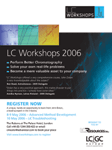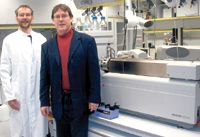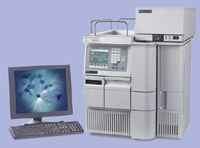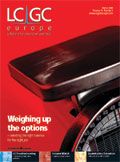LC workshops – something for the spring
Two LC workshops will be held between 8?10 May at The Rubens at The Palace Hotel, London, UK. The courses are aimed at improving method development and providing solutions to common problems that occur with LC methods. The courses are brought by LC Resources and LCGC Europe, and sponsored by Hichrom.
Two LC workshops will be held between 8–10 May at The Rubens at The Palace Hotel, London, UK. The courses are aimed at improving method development and providing solutions to common problems that occur with LC methods. The courses are brought by LC Resources and LCGC Europe, and sponsored by Hichrom.

Advanced Method Development is the first course, which is taking place on 8–9 May. It is suitable for attendees with at least one year of HPLC experience in the laboratory as well as some involvement in developing new methods or troubleshooting old ones. This course will cover a new approach to systematic method development, how to develop a satisfactory method, improving troubleshooting skills and improving understanding of the effects of chromatographic variables through the use of computer modelling.
Attendees will learn how to apply the method development principles to several real-world separation problems, demonstrating how the approach to method development works. The computer modelling principles, discussed during the course, are fully applicable to laboratory separations.
The second event, LC Troubleshooting, will be held on 10 May and is designed for anyone that works with HPLC. Experience is not required although the majority of the course will appeal to the more experienced worker.
This course aims to teach the "ins and outs" of solving problems that occur with LC methods and preventative measures to take against them. It will include operating principles of each module of an HPLC system, proven techniques for systematic problem-solving and instrument maintenance, effective, time- and money saving approaches to prevent hardware problems and method failures and extensive case studies to improve skills.
Attendees will gain a thorough understanding of HPLC systems, their operation and function, an understanding of how and why problems arise and how to prevent them. Furthermore, they will improve their ability to better perform chromatography and solve many laboratory problems and troubleshooting skills.
The course leader for these workshops will be John Dolan, the editor/author of the column "LC Troubleshooting" featured in LCGC North America and LCGC Europe. He has also written in excess of 100 papers on HPLC and related topics. He is currently general manager for BASi Northwest Laboratory and principal instructor for LC Resources.
For more information about LC Workshops contact Catherine Mealor on +44 1244 393 422 or e-mail cmealor@advanstar.com
Applied Biosystems' technology used to analyse biotoxins
Chemical ecologists from the Alfred Wegener Institute, Bremerhaven, Germany are using analysis systems from Applied Biosystems to analyse biotoxins produced by marine phytoplankton and cyanobacteria. The 4000 Q TRAP LC–MS–MS system and API 2000 LC–MS–MS system are being used to analyse the biotoxins and the 3130xl Genetic Analyser and ABI PRISM 7000 sequence detection system are also being used to investigate the biosynthetic and regulatory genes involved in producing the toxic compounds.

These substances under investigation cause many problems for aquatic ecosystems by damaging fish populations, poisoning marine mammals and seabirds, contaminating drinking water and rendering shellfish too toxic for human consumption.
Group leader and head of the biological sciences division, Professor Allan Cembella, explained, "The toxins are very potent but the amounts produced are tiny — the concentration per cell is generally in the picogram to femtogram range. Using the 4000 Q TRAP System combined with innovative liquid chromatography, we can separate an extremely complex cocktail of more than two dozen derivatives of at least five different classes of marine biotoxins in a single chromatographic run."
Rely on Alliance
An annual survey conducted by Laboratory Focus magazine has revealed that readers consider the Alliance HPLC system from Waters as the most reliable in the product category. The readership survey was conducted by the magazine's publishers and it ranked instruments as well as manufacturers.

The system was introduced in 1996 and is used in R&D and quality control laboratories worldwide. It is built around the 2695 separations module that integrates solvent and sample management and it also features a dissolution system, which allows automated on-line sample acquisition and HPLC analysis.
Waters was also ranked number 1 by readers for technical support.
Understanding FDA Recommendations for N-Nitrosamine Impurity Levels
April 17th 2025We spoke with Josh Hoerner, general manager of Purisys, which specializes in a small volume custom synthesis and specialized controlled substance manufacturing, to gain his perspective on FDA’s recommendations for acceptable intake limits for N-nitrosamine impurities.












